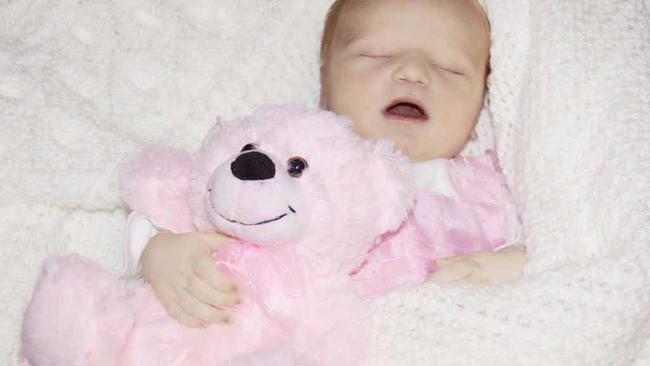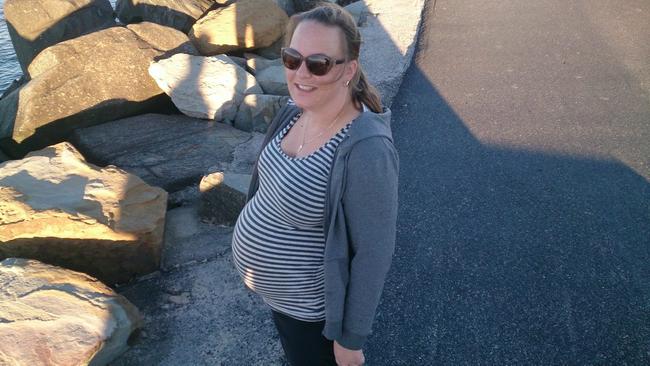Swab test could have saved baby Grace from Strep B
IMAGINE waking up after a long and painful labour expecting to be handed your new born child, but instead your partner tells you that your baby is dead.

Gladstone
Don't miss out on the headlines from Gladstone. Followed categories will be added to My News.
IMAGINE waking up after a long and painful labour expecting to be handed your new born child, but instead your partner tells you that your baby is dead.
For Sunshine Coast woman, and Queensland Health worker, Tracey Whelan that's the story of her first pregnancy.
It had taken a year and a half for Tracey to fall pregnant; she carried her baby girl to full term.
But baby Grace was pronounced dead 25 minutes after she was born on August 30, 2014.
Her lungs were badly infected by group B streptococcus - a bacteria Tracey had never even heard of before.
She was never tested for it and didn't have any symptoms during the pregnancy.
She doesn't blame the staff who treated her; instead the guidelines used by Queensland Health that don't offer women a simple swab test for the bacteria.
She's demanding the State Government change its guidelines around group B streptococcus and introduce the test, which is offered in every other state, to pregnant women.
Mums speak out on Strep B tragedies
>> Strep B claimed Chrissy's baby Harper and wedding day
>> Mum never heard of Strep B before twins were stillborn
The Queensland Health policy and guidelines are a risk-based approach, recommended by experts, where women are only tested and treated if they are considered "at risk".
That policy has just entered a regular review period. Tracey has made a formal submission to the review panel, asking them to adopt a new approach that would see every Queensland woman screened.

"It's hard when you go into hospital thinking you will have a little baby and don't get to see her open eyes," Tracey said.
"You don't expect to go home without a baby.
"I don't fault the staff or anyone who looked after us.
"They followed the policy and guidelines - it's the guidelines that let us down."
Group B streptococcus is a bacteria carried in the vagina of one-in-four women and in Australia it affects one-in-1000 babies.
Between 2000 and 2004 there was a recorded incident rate of just 0.34/10,000 live births in Queensland.
But try telling that to the mothers who have lost their babies.
For Tracey losing baby Grace had a reason, to give her the motivation she needed to try and get the Queensland guidelines changed.
Those guidelines have been in place since 2009 and the "risk factor approach" has been used since before 1999. A spokesperson for Queensland Health said using a risk-based approach allowed clinicians to identify and treat all women in labour using known risk factors. Woman who are considered at risk are treated during labour with intravenous antibiotics.
But Strep B often has no symptoms and Ms Whelan could not have known anything was wrong.
"It was a perfect pregnancy," Ms Whelan said.
"I'm pregnant again and due on December 2. I will be having the antibiotic drip.
"It brings joy to my heart to see that people are talking about this.
"I am hopeful they will change the policy."
Tracey's letter to Queensland Health (extract)
I, LIKE many others, did not show any symptoms that form the risks factors that are used to identify GBS in the current policy used by QLD Health. I did not have a temperature, my waters were only broken for 16 hours, my daughter was nearly two weeks overdue but yet she still died 25 minutes after she was born.
Obviously, the risk-based approach does not work --- my baby died.
I know I am not the only mother who has suffered unnecessarily as a result of GBS. I don't understand how a policy that does not identify GBS in 10-20% of women is an effective approach.
In the wording of the previous policy it states that the risk factor-based approach is the more cost-effective approach. How can you quantify a child's life?
The cost from the initial death or illness, doctors, nurses etc, the lifelong cost to the extended family for psychiatric care/counselling? I know I am but one mother, grieving for her baby girl because of this disease. I blame this policy/guideline for the death of my daughter.
Why not eliminate one 'what if' from the parents of babies who die from early onset GBS. From what I understand from research, most GBS infections that develop at birth can be prevented if women who have tested positive receive at least four hours of IV antibiotics just prior to delivery.
I constantly ask myself what if I had been screened, what if I had been given antibiotics during labour. There are so many things that can end a child's life that are beyond anyone's control. Why not prevent those we can.
Death or illness from GBS is preventable, please make a change to the guideline so GBS can be identified and treated. I would like to see all women screened for GBS at around 36 weeks.
If this is not changed I would like it to become included in the antenatal guidelines that all women be formally advised about Group B Strep during their antenatal care, the seriousness of GBS, that it is the leading cause of meningitis and it can kill. It is a mother's right to know about GBS and it should be their choice to be screened.


